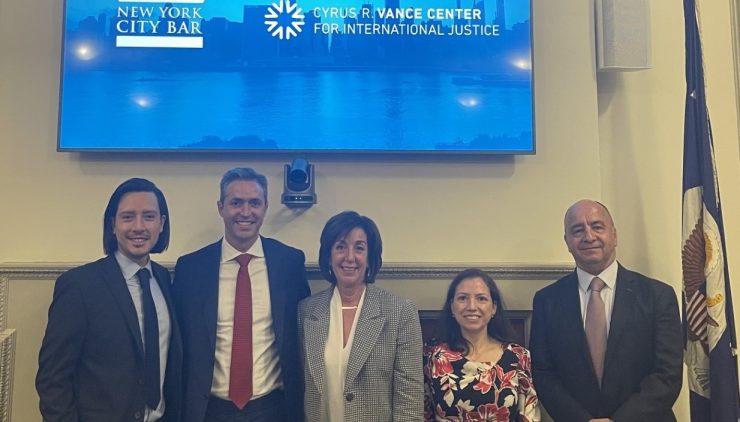This website uses cookies so that we can provide you with the best user experience possible. Cookie information is stored in your browser and performs functions such as recognising you when you return to our website and helping our team to understand which sections of the website you find most interesting and useful.
Vance Center Co-Organizes Panel Discussion on Mexico’s Rule of Law
April 2024The panel discussion, co-organized with the Mexican Bar Association, focused on the country’s current legal and political landscape and concerns over institutional integrity in light of President Lopez Obrador’s recent constitutional reforms.

From left, Vance Center Associate Executive Director Jaime Chávez Alor with panelists Diego Sierra Laris, Ambassador Roberta Jacobson (ret.), Veronica Yepez, and Jorge Sepúvelda García. Photo: Vance Center
On April 16, the Vance Center‘s Associate Executive Director Jaime Chávez Alor moderated a timely panel discussion on Mexico’s current rule of law landscape, entitled “Mexico’s Rule of Law at a Crossroads: Examining Challenges and Prospects.” The conversation, co-organized with the Mexican Bar Association (Barra Mexicana de Abogados) and the New York City Bar Association, brought together subject experts from legal and government backgrounds to address key challenges and pathways forward ahead of the country’s general elections, which are set to take place in early June 2024.
In response to Chávez Alor’s initial question on the importance of a strong rule of law in Mexico, former U.S. Ambassador to Mexico Roberta Jacobson (ret.) emphasized the relationship between a strong rule of law and a higher degree of certainty, particularly in the country’s ability to serve as a stable cross-border partner with the United States.
Other panelists spotlighted the implications of this certainty and access to justice in the context of President Lopez Obrador’s proposed reforms, a package of 18 constitutional amendments and legal reforms that include modifications across branches of government, and severe limitations on judicial civil servants’ mandates and earnings, among other changes. Diego Sierra Laris, Partner at Von Wobeser y Sierra, pointed to “high levels of integrity” among Mexican federal judges and characterized the constitutional reforms as a serious threat to the existing standard. Panelist Jorge Sepúlveda García, Partner at Garcia Jimeno, described the reforms as an effort by Mexico’s president to impose his own will – an issue outside of partisan differences – and cited Lopez Obrador’s attacks on the Mexican Bar Association as a concerning example of the President’s actions to weaken the justice system.
Panelists agreed that certainty in the rule of law allows predictability in areas beyond only judicial structures, including investment inflow, safeguarding human rights, and reducing corruption across sectors — all of which are lacking in Mexico and risk further deterioration following the proposed reforms.
Veronica Yepez, Partner at Covington & Burling, spoke about the expectations for holding corrupt companies accountable set by Mexico’s 2016 anti-corruption framework. Yepez highlighted progress on this issue in other Latin American countries like Brazil and Colombia. In contrast, she noted that Mexico’s fight against corruption boasts an extensive legislative framework, but the country lacks critical capacity, including sufficient well-trained prosecutors, to make the regulations effective. This echoed some of the main findings in the Vance Center’s Latin America Anti-Corruption Assessment (2021-2022).
Linking the political and legal challenges Mexico faces, Sierra Laris warned that “the fight against corruption has become secondary to the fight for democracy in Mexico” and that Lopez Obrador’s propensity to set and shift the agenda shows the need for technical experts, resources, and for officials to enforce standardized processes to increase transparency, effectively reduce corruption, and restore checks and balances.
Looking ahead to the upcoming elections, panelists emphasized the current issues in Mexico’s rule of law landscape that candidates should incorporate into their national agenda. Speakers highlighted the importance of influencing candidates to prioritize judicial independence, through the protection of judges and attorneys general, and providing material and human resources to support prosecutors.
Ambassador Jacobson framed the legal community’s concerns in terms of the lives of Mexican voters: security, and the lack thereof, is a top priority for most Mexicans. Emphasizing the relationship between personal security in day-to-day life and a strong rule of law, she called for the Mexican Bar Association and candidates alike to make this connection clear to the public ahead of the elections.
The relationship between corruption, the rule of law, and justice systems, and the role of the legal community in upholding anti-corruption efforts, are essential components of the Vance Center’s work on institutional integrity. This issue is the central focus of the Vance Center’s biannual Latin America Anti-Corruption Assessment, which has a new edition slated for publication at the end of 2024.


